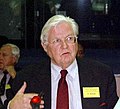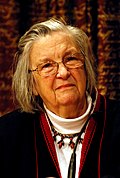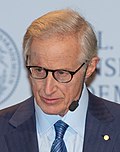List of Nobel Prize winners in Economics
Wikimedia list article From Wikipedia, the free encyclopedia
The Sveriges Riksbank Prize in Economic Sciences in Memory of Alfred Nobel,[1] commonly called the Nobel Prize in Economics, is a prize awarded each year for outstanding contributions in the field of economics. The prize was not one of the awards set out in the will of Alfred Nobel. The winners of the prize receive their diploma and gold medal from the Swedish monarch at the same December 10 ceremony in Stockholm as the Nobel laureates in physics, chemistry, physiology or medicine, and literature. The amount of money awarded is the same as the other prizes.
Winners
| Year | Laureate | Country | Rationale | Ph.D. alma mater | Institution (most significant tenure/at time of receipt) | ||
|---|---|---|---|---|---|---|---|
| 1969 |  |
Ragnar Frisch | "for having developed and applied dynamic models for the analysis of economic processes"[2] | University of Oslo | University of Oslo | ||
 |
Jan Tinbergen | Leiden University | Erasmus University | ||||
| 1970 |  |
Paul Samuelson | "for the scientific work through which he has developed static and dynamic economic theory and actively contributed to raising the level of analysis in economic science"[3] | Harvard University | Massachusetts Institute of Technology | ||
| 1971 |  |
Simon Kuznets | "for his empirically founded interpretation of economic growth which has led to new and deepened insight into the economic and social structure and process of development"[4] | Columbia University | Harvard University | ||
| 1972 |  |
John Hicks | "for their pioneering contributions to general economic equilibrium theory and welfare theory."[5] | University of Oxford | University of Oxford | ||
 |
Kenneth Arrow | Columbia University | Harvard University | ||||
| 1973 |  |
Wassily Leontief | "for the development of the input-output method and for its application to important economic problems"[6] | University of Berlin | Harvard University | ||
| 1974 |  |
Gunnar Myrdal | "for their pioneering work in the theory of money and economic fluctuations and for their penetrating analysis of the interdependence of economic, social and institutional phenomena."[7] | Stockholm University | Stockholm University | ||
 |
Friedrich Hayek | University of Vienna | London School of Economics, University of Chicago | ||||
| 1975 |  |
Leonid Kantorovich | "for their contributions to the theory of optimum allocation of resources"[8] | Leningrad State University | Novosibirsk State University | ||
 |
Tjalling Koopmans | University of Leiden | University of Chicago, Yale University | ||||
| 1976 |  |
Milton Friedman | "for his achievements in the fields of consumption analysis, monetary history and theory and for his demonstration of the complexity of stabilisation policy"[9] | Columbia University | University of Chicago | ||
| 1977 |  |
Bertil Ohlin | "for their pathbreaking contribution to the theory of international trade and international capital movements"[10] | Stockholm University | Stockholm School of Economics | ||
 |
James Meade | University of Cambridge | University of Cambridge | ||||
| 1978 |  |
Herbert A. Simon | "for his pioneering research into the decision-making process within economic organizations"[11] | University of Chicago | Carnegie Mellon University | ||
| 1979 | Theodore Schultz | "for their pioneering research into economic development research with particular consideration of the problems of developing countries."[12] | University of Wisconsin-Madison | University of Chicago | |||
| W. Arthur Lewis | London School of Economics | Princeton University | |||||
| 1980 | Lawrence Klein | "for the creation of econometric models and the application to the analysis of economic fluctuations and economic policies"[13] | Massachusetts Institute of Technology | University of Pennsylvania | |||
| 1981 |  |
James Tobin | "for his analysis of financial markets and their relations to expenditure decisions, employment, production and prices"[14] | Harvard University | Yale University | ||
| 1982 | George Stigler | "for his seminal studies of industrial structures, functioning of markets and causes and effects of public regulation"[15] | University of Chicago | University of Chicago | |||
| 1983 |  |
Gérard Debreu | "for having incorporated new analytical methods into economic theory and for his rigorous reformulation of the theory of general equilibrium"[16] | École Normale Supérieure University of Paris |
University of California, Berkeley | ||
| 1984 | Richard Stone | "for having made fundamental contributions to the development of systems of national accounts and hence greatly improved the basis for empirical economic analysis"[17] | University of Cambridge | University of Cambridge | |||
| 1985 |  |
Franco Modigliani | "for his pioneering analyses of saving and of financial markets"[18] | The New School for Social Research | Massachusetts Institute of Technology | ||
| 1986 |  |
James M. Buchanan | "for his development of the contractual and constitutional bases for the theory of economic and political decision-making"[19] | University of Chicago | George Mason University | ||
| 1987 |  |
Robert Solow | "for his contributions to the theory of economic growth"[20] | Harvard University | Massachusetts Institute of Technology | ||
| 1988 |  |
Maurice Allais | "for his pioneering contributions to the theory of markets and efficient utilization of resources"[21] | École Polytechnique | École Nationale Supérieure des Mines de Paris, Paris Nanterre University | ||
| 1989 |  |
Trygve Haavelmo | "for his clarification of the probability theory foundations of econometrics and his analyses of simultaneous economic structures"[22] | University of Oslo | University of Oslo | ||
| 1990 | Harry Markowitz | "for their pioneering work in the theory of financial economics"[23] | University of Chicago | City University of New York | |||
| Merton Miller | Johns Hopkins University | Carnegie Mellon University, University of Chicago | |||||
 |
William F. Sharpe | University of California, Los Angeles | Stanford University | ||||
| 1991 |  |
Ronald Coase | "for his discovery and clarification of the significance of transaction costs and property rights for the institutional structure and functioning of the economy"[24] | London School of Economics | University of Chicago, London School of Economics | ||
| 1992 |  |
Gary Becker | "for having extended the domain of microeconomic analysis to a wide range of human behaviour and interaction, including non-market behaviour"[25] | University of Chicago | University of Chicago | ||
| 1993 |  |
Robert Fogel | "for having renewed research in economic history by applying economic theory and quantitative methods in order to explain economic and institutional change"[26] | Johns Hopkins University | University of Chicago | ||
 |
Douglass North | University of California, Berkeley | Washington University in St Louis | ||||
| 1994 | John Harsanyi | "for their pioneering analysis of equilibria in the theory of non-cooperative games."[27] | Stanford University | University of California, Berkeley | |||
 |
John Forbes Nash | Princeton University | Princeton University | ||||
 |
Reinhard Selten | Goethe University Frankfurt | University of Bonn | ||||
| 1995 | Robert Lucas Jr. | "for having developed and applied the hypothesis of rational expectations, and thereby having transformed macroeconomic analysis and deepened our understanding of economic policy"[28] | University of Chicago | University of Chicago | |||
| 1996 | James Mirrlees | "for their fundamental contributions to the economic theory of incentives under asymmetric information"[29] | University of Cambridge | University of Oxford, University of Cambridge | |||
| William Vickrey | Columbia University | Columbia University | |||||
| 1997 |  |
Robert C. Merton | "for a new method to determine the value of derivatives."[30] | Massachusetts Institute of Technology | Massachusetts Institute of Technology | ||
 |
Myron Scholes | University of Chicago | Massachusetts Institute of Technology | ||||
| 1998 |  |
Amartya Sen | "for his contributions to welfare economics"[31] | University of Cambridge | Harvard University, University of Cambridge | ||
| 1999 |  |
Robert Mundell | "for his analysis of monetary and fiscal policy under different exchange rate regimes and his analysis of optimum currency areas"[32] | Massachusetts Institute of Technology | Columbia University | ||
| 2000 |  |
James Heckman | "for his development of theory and methods for analyzing selective samples"[33] | Princeton University | University of Chicago | ||
| Daniel McFadden | "for his development of theory and methods for analyzing discrete choice"[33] | University of Minnesota | University of California Berkeley, Massachusetts Institute of Technology | ||||
| 2001 |  |
George Akerlof | "for their analyses of markets with asymmetric information"[34] | Massachusetts Institute of Technology | Georgetown University, University of California Berkeley | ||
 |
Michael Spence | Harvard University | Harvard University | ||||
 |
Joseph E. Stiglitz | Massachusetts Institute of Technology | Princeton University, Columbia University | ||||
| 2002 |  |
Daniel Kahneman | "for having integrated insights from psychological research into economic science, especially concerning human judgment and decision-making under uncertainty"[35] | University of California, Berkeley | Princeton University, University of British Columbia | ||
 |
Vernon L. Smith | "for having established laboratory experiments as a tool in empirical economic analysis, especially in the study of alternative market mechanisms"[35] | Harvard University | University of Arizona | |||
| 2003 |  |
Robert F. Engle | "for methods of analyzing economic time series with time-varying volatility (ARCH)"[36] | Cornell University | University of California, San Diego | ||
 |
Clive Granger | "for methods of analyzing economic time series with common trends (cointegration)"[36] | University of Nottingham | University of California, San Diego | |||
| 2004 |  |
Finn E. Kydland | "for their contributions to dynamic macroeconomics: the time consistency of economic policy and the driving forces behind business cycles."[37] | Carnegie Mellon University | Carnegie Mellon University | ||
 |
Edward C. Prescott | Carnegie Mellon University | Carnegie Mellon University, Arizona State University | ||||
| 2005 |  |
Robert J. Aumann | "for having enhanced our understanding of conflict and cooperation through game-theory analysis."[38] | Massachusetts Institute of Technology | Hebrew University of Jerusalem | ||
 |
Thomas C. Schelling | Harvard University | Yale University, Harvard University | ||||
| 2006 |  |
Edmund S. Phelps | "for his analysis of intertemporal tradeoffs in macroeconomic policy"[39] | Yale University | Columbia University | ||
| 2007 |  |
Leonid Hurwicz | "for having laid the foundations of mechanism design theory"[40] | London School of Economics | University of Minnesota, Iowa State University | ||
 |
Eric S. Maskin | Harvard University | Harvard University | ||||
 |
Roger B. Myerson | Harvard University | Northwestern University | ||||
| 2008 |  |
Paul Krugman | "for his analysis of trade patterns and location of economic activity"[41] | Massachusetts Institute of Technology | Princeton University | ||
| 2009 |  |
Elinor Ostrom | "for her analysis of economic governance, especially the commons"[42] | University of California, Los Angeles | Indiana University | ||
 |
Oliver E. Williamson | "for his analysis of economic governance, especially the boundaries of the firm"[42] | Carnegie Mellon University | University of Pennsylvania, University of California Berkeley | |||
| 2010 |  |
Peter A. Diamond | "for their analysis of markets with search frictions"[43] | Massachusetts Institute of Technology | Massachusetts Institute of Technology | ||
 |
Dale T. Mortensen | Carnegie Mellon University | Northwestern University | ||||
 |
Christopher A. Pissarides | London School of Economics | London School of Economics | ||||
| 2011 |  |
Thomas J. Sargent | "for their empirical research on cause and effect in the macroeconomy"[44] | Harvard University | Hoover Institution, University of Minnesota | ||
 |
Christopher A. Sims | Harvard University | University of Minnesota | ||||
| 2012 |  |
Alvin E. Roth | "for the theory of stable allocations and the practice of market design."[45] | Stanford University | Stanford University, Harvard University | ||
 |
Lloyd S. Shapley | Princeton University | University of California, Los Angeles | ||||
| 2013 |  |
Eugene F. Fama | "for their empirical analysis of asset prices."[46] | University of Chicago | University of Chicago | ||
 |
Lars Peter Hansen | University of Minnesota | University of Chicago | ||||
 |
Robert J. Shiller | Massachusetts Institute of Technology | Yale University | ||||
| 2014 |  |
Jean Tirole | "for his analysis of market power and regulation".[47] | Massachusetts Institute of Technology | Massachusetts Institute of Technology Toulouse School of Economics École des hautes études en sciences sociales | ||
| 2015 |  |
Angus Deaton | "for his analysis of consumption, poverty, and welfare".[48] | University of Cambridge | University of Bristol, Princeton University | ||
| 2016 |  |
Oliver Hart | "for their contributions to contract theory".[49] | Princeton University | Massachusetts Institute of Technology, Harvard University | ||
 |
Bengt Holmström | Stanford University | Massachusetts Institute of Technology, Yale University | ||||
| 2017 |  |
Richard Thaler | "for his contributions to behavioural economics".[50] | University of Rochester | Cornell University, University of Chicago | ||
| 2018 |  |
William Nordhaus | "for integrating climate change into long-run macroeconomic analysis"[51] | Massachusetts Institute of Technology | Yale University | ||
 |
Paul Romer | "for integrating technological innovations into long-run macroeconomic analysis" | University of Chicago | New York University | |||
| 2019 |  |
Abhijit Banerjee | "for their experimental approach to alleviating global poverty"[52] | Harvard University | Massachusetts Institute of Technology | ||
 |
Esther Duflo | Massachusetts Institute of Technology | Massachusetts Institute of Technology | ||||
| Michael Kremer | Harvard University | Harvard University | |||||
| 2020 |  |
Paul Milgrom | "for improvements to auction theory and inventions of new auction formats." | Stanford University | Stanford University | ||
| Robert B. Wilson | Harvard University | Stanford University | |||||
| 2021 |  |
David Card | "for his empirical contributions to labour economics"[53] | Princeton University | Berkeley | ||
| Joshua Angrist | "for their methodological contributions to the analysis of causal relationships"[53] | Princeton University | MIT | ||||
 |
Guido W. Imbens | Brown University | Stanford University | ||||
| 2022 |  |
Ben Bernanke | "for research on banks and financial crises"[54] | Massachusetts Institute of Technology | Princeton University, Brookings Institution | ||
| Douglas Diamond | Yale University | University of Chicago | |||||
| Philip H. Dybvig | Yale University | Washington University in St. Louis | |||||
| 2023 |  |
Claudia Goldin | "for having advanced our understanding of women's labour market outcome"[55] | University of Chicago | Harvard University | ||
| 2024 |  |
Daron Acemoglu | "for studies of how institutions are formed and affect prosperity"[56] | London School of Economics | |||
 |
Simon Johnson | Massachusetts Institute of Technology | Massachusetts Institute of Technology | ||||
 |
James A. Robinson | Yale University | University of Chicago |
Related pages
References
Other websites
Wikiwand - on
Seamless Wikipedia browsing. On steroids.